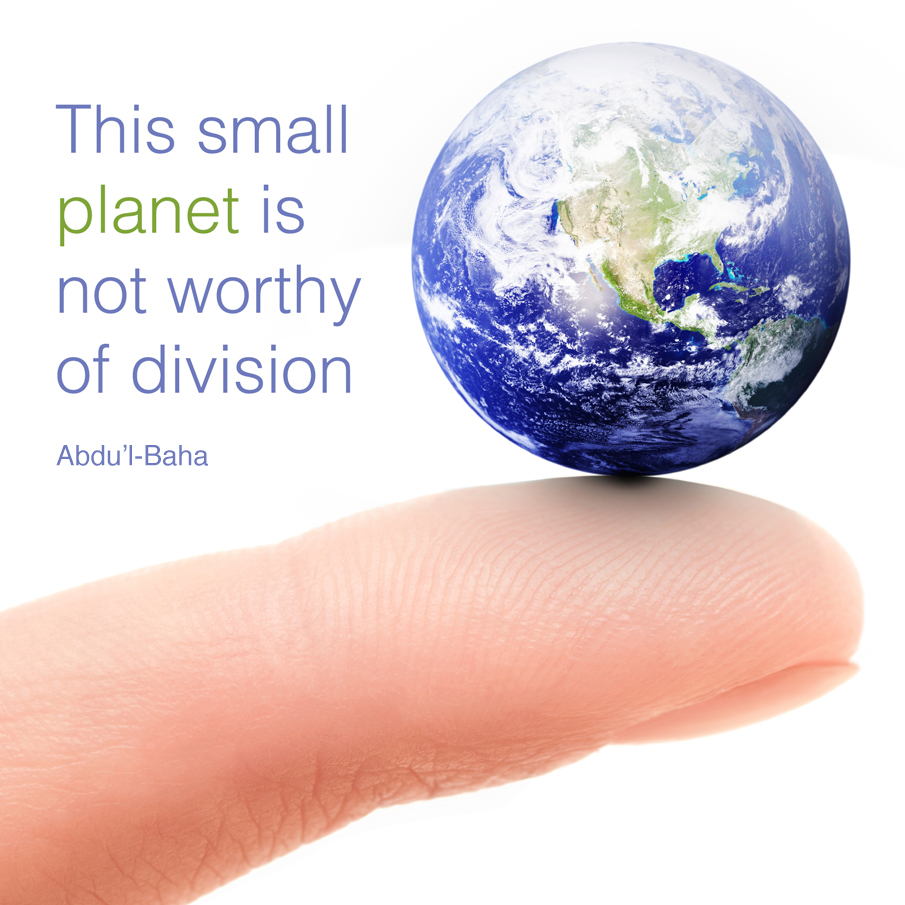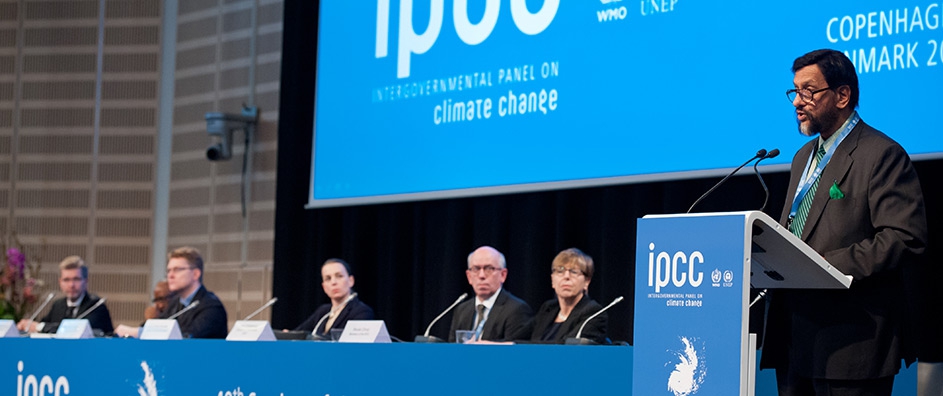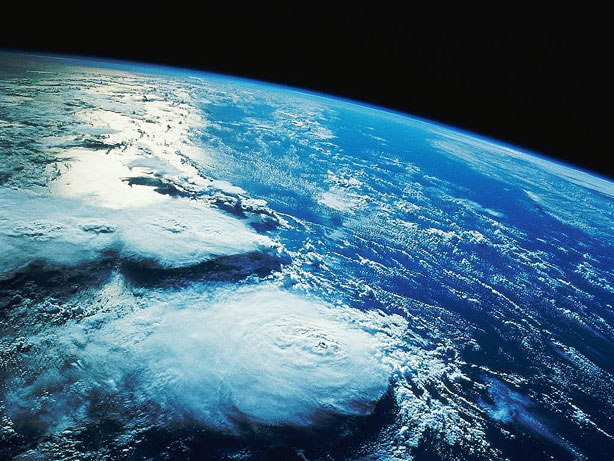The views expressed in our content reflect individual perspectives and do not represent the authoritative views of the Baha'i Faith.
This globe of ours is one of the smallest planets. Those stupendous bodies revolving in yonder immeasurable space, the infinite blue canopy of God, are many times greater than our small earth. To our eyes this globe appears spacious; yet when we look upon it with divine eyes, it is reduced to the tiniest atom. This small planet is not worthy of division. Is it not one home, one native land? Is not all humanity one race? – Abdu’l-Baha, Divine Philosophy, p. 178.
 The Baha’i Faith teaches that the earth is one country, and that all humanity constitutes a single race. Those primary Baha’i principles, first taught by Baha’u’llah in the middle of the 19th century, have now spread around the world and have begun to penetrate and influence the consciousness of humankind.
The Baha’i Faith teaches that the earth is one country, and that all humanity constitutes a single race. Those primary Baha’i principles, first taught by Baha’u’llah in the middle of the 19th century, have now spread around the world and have begun to penetrate and influence the consciousness of humankind.
In many ways, the widespread acceptance and support of the environmental movement has helped bring about a growing awareness of our single global home. One of the best examples of that major trend, The Earth Charter, first developed in 1968, advocates “a sustainable global society founded on respect for nature, universal human rights, economic justice, and a culture of peace.”
A hundred years ago, when Abdu’l-Baha rhetorically asked if our small planet is one native land, the world’s population did not yet know the defined limits of our global assets. Few people then understood the concept of the Earth as a closed system with finite natural resources. The idea of sustainable human development—“development that meets the needs of the present without compromising the ability of future generations to meet their own needs,” according to the commonly-accepted United Nations definition—had not even occurred to most of the world’s pundits, policymakers or governments.
But that has now changed dramatically. In just the short historical span of a single century, across the course of one human lifetime, we have started to develop a world-embracing mindfulness of the limits to our growth, of our planetary citizenship and of our connection to all living things–which the Baha’i teachings have long urged us to consider, embrace and adopt.
More and more people have begun to realize that the Baha’i vision of a harmonious, peaceful and sustainable global civilization represents much more than just some far-off goal or unreachable utopian dream. Instead, our scientists, researchers and many farsighted statesmen now tell us, we must implement that global vision–in this century–or suffer enormous, irreversible consequences. That’s the main message of a major new United Nations report on the environment.
In its newly-released scientific study, The Intergovernmental Panel on Climate Change (www.ipcc.ch) says that failure to reduce our world’s carbon emissions in this century will threaten every society on the planet, provoking severe food shortages; the flooding of many of the world’s major shorelines, island nations and urban areas; the resultant vast refugee crisis; and the mass extinction of plants and animals. The IPCC reports that in a climate so drastically altered, it could become dangerous even to work or play outside during the hottest times of the year. Unless we act now these drastic impacts, science and governments have concluded, will permanently imperil the entire world’s stability, security and sustainability. The continuing, increasing, unregulated and unchecked emissions of greenhouse gases, the report says, “will cause further warming and long-lasting changes in all components of the climate system, increasing the likelihood of severe, pervasive and irreversible impacts for people and ecosystems.”
The IPCC’s latest report found that the only way to effectively limit global warming involves developing and enforcing serious policies to leave the majority of the world’s fossil fuel reserves unburned and in the ground. The IPCC panel of scientists reported that the world must somehow find ways to restrict the burning of fossil fuels, primarily coal and oil, to a global “carbon budget” of less than a trillion tons burned–ever. Unless we act, at current growth rates we will reach that level in approximately 30 years.
Energy companies, driven by their enormously profitable business models, will continue to pump oil and mine coal and sell it to us, unless we can rapidly find ways to reduce emissions with alternative energy sources—and effectively regulate the use of carbon-based fuels. Only a handful of the world’s national governments have found effective methods for accomplishing those goals. In fact, many governments still directly subsidize and promote the consumption of fossil fuels, to the tune of $600 billion—much more than the total of $400 billion now spent around the world to reduce emissions.
The new IPCC report, a 175-page synopsis of a much longer series of studies the panel has issued, marks the final step in a five-year effort by the prestigious body to analyze a massive archive of published climate research conducted by hundreds of scientists and institutions worldwide. The report represents the most sophisticated, advanced and accurate climate forecasting ever undertaken.
After the release of the IPCC report, the United Nations secretary general, Ban Ki-moon, said, “Science has spoken. There is no ambiguity in their message. Leaders must act. Time is not on our side.”
Instead, world leaders have only agreed, so far, to let each country decide for itself how much effort to put into limiting carbon emissions. Many of those leaders cite “economic growth” as their chief reason for not doing more. As a result, the global community of nations, even with this call to act swiftly and aggressively, has so far failed to seriously address the climate change crisis. In fact, we have reached the point where nationalism itself seems powerless to solve such an overwhelming international problem.
From a Baha’i perspective, addressing this looming global calamity will only become a reality when we implement an effective, democratic system of global governance:
Though loyal to their respective governments, though imbued with the love of their own country, and anxious to promote, at all times, its best interests, the followers of the Baha’i Faith, nevertheless, viewing mankind as one entity, and profoundly attached to its vital interests, will not hesitate to subordinate every particular interest, be it personal, regional or national, to the over-riding interests of the generality of mankind, knowing full well that in a world of interdependent peoples and nations the advantage of the part is best to be reached by the advantage of the whole, and that no lasting result can be achieved by any of the component parts if the general interests of the entity itself are neglected. – Shoghi Effendi, The Promised Day is Come, p. vi.
You May Also Like
Comments


















http://wattsupwiththat.com/2014/12/05/friday-funny-over-a-centurys-worth-of-failed-eco-climate-quotes-and-disinformation/